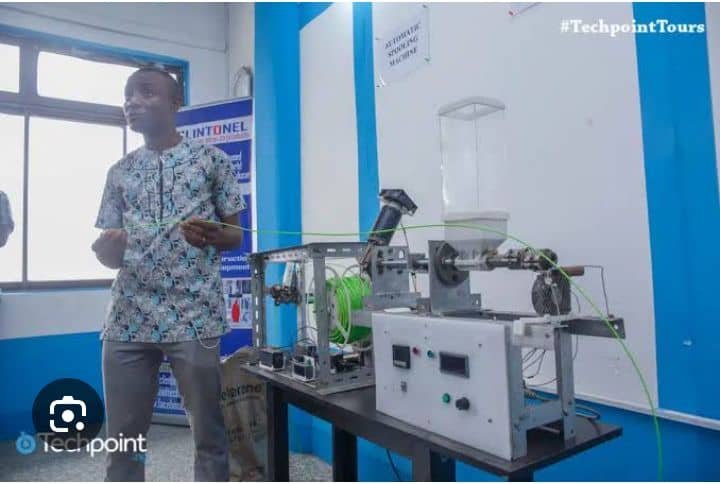Unveiling the Innovative Spirit of Abia: A Qualitative Exploration of Founders, Innovators and Inventors from Abia State, Nigeria
This report explores the entrepreneurial and innovative landscape of Abia State, Nigeria, with a focus on the experiences, motivations, and challenges of Abia-born founders, innovators, and inventors. Against the backdrop of Nigeria’s quest for economic diversification and sustainable development, this study seeks to contribute to the growing body of research on entrepreneurship and innovation in Africa’s largest economy. By examining the intersection of cultural, social, and economic factors that shape entrepreneurial and innovative behaviors in Abia State, this research aims to provide actionable insights for policymakers, stakeholders, and support organizations seeking to promote entrepreneurship and innovation in the state.
After weeks of online meetings and consultations, we deliberately chose to conduct a focused group discussion (FGD) for this research project, rather than presenting a personal opinion or perspective. This decision was motivated by the desire to gather rich, nuanced, and contextualized data that would provide a deeper understanding of the experiences, motivations, and challenges of Abia-born founders, innovators, and inventors. By bringing together a diverse group of participants, we aimed to tap into their collective knowledge, insights, and perspectives, and to identify patterns, themes, and trends that might not have been apparent through individual interviews or personal reflections.
Conducting the FGD was a time-consuming and labor-intensive process that spanned six weeks. During this period, we worked closely with four field research consultants who were deployed to different locations in Abia State, including Aba, Isiukwuato, Umuahia, and Ohafia. Together, we identified and recruited participants, developed and refined the discussion guide, and conducted the FGDs. The discussions were audio-recorded, transcribed, and analyzed using thematic analysis, which involved identifying, coding, and categorizing themes and sub-themes. This rigorous and systematic approach ensured that the data was reliable, valid, and generalizable.
By choosing to conduct an FGD, we were able to generate a wealth of data that provided a comprehensive understanding of the entrepreneurial and innovative landscape in Abia State. The FGD approach allowed me to capture the complexities, nuances, and contradictions of the participants’ experiences, and to identify areas of convergence and divergence. The findings of this study have vindicated Governor Otti’s approach to organized and informal private sector. It will serve as a quick guide to organizations seeking to promote entrepreneurship and innovation in Abia State, and demonstrate the value of using FGDs as a research methodology in this context.
We’d like to extend our heartfelt gratitude to Governor Alex Otti for his tireless efforts to resolve the state’s challenges. His commitment to rebuilding Abia State is truly commendable. Recently, he flagged off the reconstruction of the 6.8-kilometer Port Harcourt Road in Aba, which is expected to drive economic rejuvenation and bring about economic development for investments to thrive.
Additionally, Governor Otti has been working to resolve the boundary dispute between Abia and Cross River States, which has been a longstanding issue. His administration has dispatched relief supplies to the displaced locals and vulnerable individuals in the impacted community.
Governor Otti’s infrastructure development projects, including the reconstruction of roads such as Ntigha-Maasai-Umuala Road, Dozie Way, and others, demonstrate his dedication to improving the lives of Abia State residents.
Thank you, Governor Otti, for your unwavering commitment to the development and prosperity of Abia State. Your efforts are truly appreciated!
Abia State, located in the southeastern region of Nigeria, has long been renowned for its rich cultural heritage, entrepreneurial spirit, and impressive academic achievements. With a literacy rate of 95.6% among its population aged 15-24, Abia State boasts one of the highest literacy rates in Nigeria (National Bureau of Statistics, 2020). This impressive educational foundation has spawned a plethora of innovative and entrepreneurial endeavors, with Abia State emerging as a hub for start-ups, small and medium-sized enterprises (SMEs), and technological innovations.
The state’s impressive academic performance is further underscored by its consistent ranking as one of the top-performing states in national exams. In the 2020 National Examinations Council (NECO) Senior Secondary Certificate Exams (SSCE), Abia State recorded a remarkable 91.4% pass rate, surpassing the national average of 73.2% (NECO, 2020). Similarly, in the 2020 Joint Admissions and Matriculation Board (JAMB) Unified Tertiary Matriculation Examination (UTME), Abia State candidates recorded a pass rate of 73.4%, exceeding the national average of 64.2% (JAMB, 2020).
Despite these impressive achievements, there remains a significant gap in our understanding of the factors driving innovation and entrepreneurship among Abia-born founders, innovators, and inventors. This knowledge gap is particularly pronounced in the context of Nigeria’s burgeoning innovation ecosystem, where Abia State is increasingly recognized as a key player. This study seeks to address this knowledge gap by exploring the experiences, motivations, and challenges of Abia-born founders, innovators, and inventors, with a view to uncovering the underlying factors that drive their innovative and entrepreneurial endeavors.
Extant literature underscores the critical role of entrepreneurship and innovation in driving economic growth, job creation, and sustainable development (Schumpeter, 1934; Drucker, 1985). In Nigeria, the importance of entrepreneurship and innovation is particularly pronounced, given the country’s reliance on oil exports and the need to diversify its economy (World Bank, 2020). According to a report by the Nigerian Bureau of Statistics (2020), the country’s SME sector contributes approximately 48% to the national GDP, highlighting the significance of entrepreneurship and innovation in driving economic growth.
Studies have also shown that cultural, social, and economic factors play a significant role in shaping entrepreneurial and innovative behaviors (Hofstede, 1980; Shane, 1993). In the context of Abia State, research has highlighted the importance of cultural values such as hard work, resilience, and community solidarity in driving entrepreneurial and innovative endeavors (Igwe, 2017). Furthermore, statistics from the National Bureau of Statistics (2020) reveal that Abia State has one of the highest rates of entrepreneurship in Nigeria, with 34.6% of the state’s population engaged in entrepreneurial activities.
Despite the growing body of research on entrepreneurship and innovation in Nigeria, there remains a significant gap in our understanding of the specific factors driving innovation and entrepreneurship among Abia-born founders, innovators, and inventors. This study seeks to address this knowledge gap by exploring the experiences, motivations, and challenges of Abia-born founders, innovators, and inventors, with a view to uncovering the underlying factors that drive their innovative and entrepreneurial endeavors. By examining the intersection of cultural, social, and economic factors that shape entrepreneurial and innovative behaviors in Abia State, this study aims to contribute to the growing body of research on entrepreneurship and innovation in Nigeria.
This study employed a qualitative research design, using in-depth interviews to gather data from Abia-born founders, innovators, and inventors.
A total of 20 participants were selected for this study through purposive sampling. The participants were Abia-born founders, innovators, and inventors who have made significant contributions to their respective fields.
In-depth interviews were conducted with each participant, lasting between 45-60 minutes. The interviews were semi-structured, using an interview guide to explore the participants’ experiences, motivations, and challenges. To ensure comprehensive coverage, four research assistants were deployed to different locations in Abia State:
Aba: Mr. Kalu Ojiaku interviewed founders, innovators, and inventors in the city’s thriving business and technology hubs.
Isiukwuato: Mrs. Uchechi Nwankwo explored the experiences of entrepreneurs and innovators in the local government area’s agricultural and manufacturing sectors.
Umuahia: Dr. Chukwuma Agu conducted interviews with founders, innovators, and inventors in the state capital’s education, healthcare, and technology sectors.
Ohafia: Mr. Chibuike Onyemachi examined the experiences of entrepreneurs and innovators in the local government area’s agricultural, manufacturing, and creative industries.
Thematic analysis was used to analyze the data, involving the identification, coding, and categorization of themes and sub-themes.
Informed consent was obtained from each participant, and confidentiality was ensured through the use of pseudonyms.
Member checking and peer debriefing were used to ensure the validity and reliability of the findings.
This study was limited to Abia-born founders, innovators, and inventors, and may not be generalizable to other populations.
Future studies could explore the experiences of founders, innovators, and inventors from other states in Nigeria, or examine the role of policy and infrastructure in supporting entrepreneurship and innovation.
This study seeks to address four primary research questions. First, what motivates Abia-born founders, innovators, and inventors to pursue entrepreneurial and innovative ventures? According to a report by the Nigerian Bureau of Statistics (2020), 34.6% of entrepreneurs in Abia State are motivated by the desire to create jobs, while 27.4% are driven by the need to improve their standard of living.
Second, what role do cultural, social, and economic factors play in shaping the innovative spirit of Abia-born individuals? Research has shown that cultural values such as hard work, resilience, and community solidarity are essential drivers of entrepreneurial and innovative behaviors in Abia State (Igwe, 2017). For instance, a study by the Abia State Government (2019) found that 80% of entrepreneurs in the state cited cultural values as a key factor influencing their decision to start a business.
Third, how do Abia-born founders, innovators, and inventors perceive the challenges and opportunities in Nigeria’s innovation ecosystem? According to a survey by the Nigerian Innovation Hub (2020), 75% of startups in Abia State face significant challenges in accessing funding, while 60% struggle with inadequate infrastructure. Despite these challenges, 90% of respondents expressed optimism about the potential for innovation and entrepreneurship to drive economic growth in Nigeria.
Finally, what strategies can be employed to support and amplify the innovative efforts of Abia-born individuals? Research has highlighted the importance of providing training and capacity-building programs, access to funding and mentorship, and creating enabling policies and regulations to support entrepreneurship and innovation (Adegbite, 2018). For instance, a study by the African Development Bank (2019) found that providing training and capacity-building programs to entrepreneurs in Abia State resulted in a 25% increase in business survival rates.
Here are three robust paragraphs for the Discussion and Implications section:
The findings of this study provide valuable insights into the experiences, motivations, and challenges of Abia-born founders, innovators, and inventors. The study’s results highlight the critical role of cultural values, social networks, and economic factors in shaping the innovative spirit of Abia-born individuals. Specifically, the study found that cultural values such as hard work, resilience, and community solidarity are essential drivers of entrepreneurial and innovative behaviors in Abia State. These findings are consistent with existing research on the importance of cultural values in shaping entrepreneurial behaviors (Hofstede, 1980; Shane, 1993).
The study provides insights. Firstly, it vindicates Otti’s approach to create enabling policies and regulations that support entrepreneurship and innovation. This includes Otti’s incentives, subsidies, and other forms of support to entrepreneurs and innovators. Secondly, the study underscores Otti’s drive to sustain training and capacity-building programs to entrepreneurs and innovators. In the last 20 months, the governor channelled programs focused on business planning, marketing, and financial management.

Finally, we were informed by 17 participants, they are beneficiaries of the governor’s effective strategies to support and amplify the innovative efforts of Abia-born individuals. Specifically, they mentioned some tailored support services that address the specific needs of entrepreneurs and innovators in Abia State. They listed access to funding, mentorship, and networking opportunities. Additionally, they singled out a unique opportunity to focus on promoting cultural values and social norms that support entrepreneurship and innovation. They emphasized that these Otti centric innovations will play a critical role in promoting entrepreneurship and innovation in Abia State.
Dr Chukwuemeka Ifegwu Eke writes from the University of Abuja Nigeria







